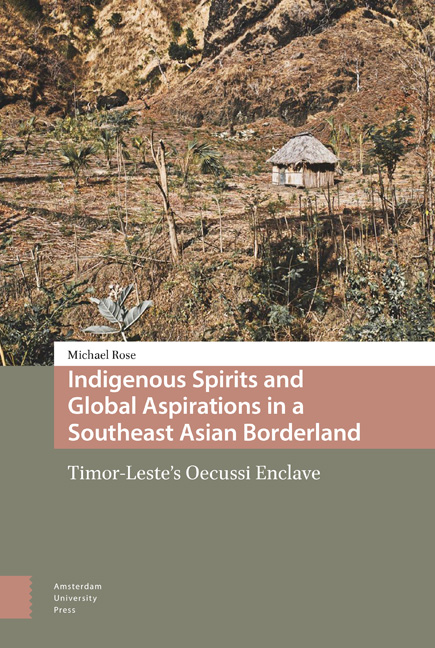 Indigenous Spirits and Global Aspirations in a Southeast Asian Borderland
Indigenous Spirits and Global Aspirations in a Southeast Asian Borderland Book contents
- Frontmatter
- Contents
- List of images
- Map
- A Note On Language
- Acknowledgements
- 1 Frontiers Imagined, Frontiers Observed
- 2 Body and Belief in Timor-Leste
- 3 The Ruin and Return of Markus Sulu
- 4 Angry Spirits in the Special Economic Zone
- 5 Stones, Saints and the ‘Sacred Family’
- 6 Meto Kingship and Environmental Governance
- 7 Ritual Speech and Education in Kutete
- Concluding Thoughts: Encounter, Change, Experience
- Selected Glossary
- Bibliography
- Index
- Miscellaneous Endmatter
4 - Angry Spirits in the Special Economic Zone
Published online by Cambridge University Press: 21 November 2020
- Frontmatter
- Contents
- List of images
- Map
- A Note On Language
- Acknowledgements
- 1 Frontiers Imagined, Frontiers Observed
- 2 Body and Belief in Timor-Leste
- 3 The Ruin and Return of Markus Sulu
- 4 Angry Spirits in the Special Economic Zone
- 5 Stones, Saints and the ‘Sacred Family’
- 6 Meto Kingship and Environmental Governance
- 7 Ritual Speech and Education in Kutete
- Concluding Thoughts: Encounter, Change, Experience
- Selected Glossary
- Bibliography
- Index
- Miscellaneous Endmatter
Summary
Abstract
Soon I after I arrived back in Oecussi the people of its coastal fringe were told to prepare for the mass expropriation of their land by the state. Jake's family was one of these households. Through the story of how Jake's grandmother, Marta, came down from the mountains as a girl and made a life by the sea, I show how resettled mountain folk have continued to engage with the land largely through spiritually mediated frameworks and understandings traceable to their highland origins. Through my own experience of an illness attributed by one of Mahata's resident mediums (ahinet) to these spirits I grapple with the ways in which these understandings are manifested in somatic experience as well as readily articulated belief.
Keywords: phenomenology, special economic zone, health, traditional medicine
Building on the idea developed in the two preceding chapters that the spiritual and socio-economic realties of meto life can be manifested through somatic experiences such as spirit possession, illness, and death, in this chapter I draw on the notion of affect to query specifically how these perspectives might complicate the logic of top-down, investment-driven economic development.
Despite the familiar potholes and dogs dozing complacently on Pante Makassar's main thoroughfare, as I began my fieldwork in Oecussi, plans were afoot to remake Oecussi as a hub for foreign investment, the Zona Especiais de Economica Social de Mercado (ZEESM – Special Zone for Social Market Economy). In 2013, it was announced that Timor-Leste's Oecussi enclave would become the site of its first special economic zone. The programme is intended to transform the enclave into a regional transportation, industrial, and tourism hub through a massive programme of infrastructure construction and foreign investment.
Despite beginning with high hopes, by May 2015 serious concerns had been raised about the appropriateness of ZEESM's conduct, most significantly including the large-scale, uncompensated acquisition of land and the fostering of an atmosphere described by one focus group as characterized by ‘violence instead of consultation’ (Meitzner Yoder, 2016b). In this chapter I set out to sketch something of how the Meto of Oecussi think about and experience their environment (pah meto’), a task lent urgency by ZEESM's resolve to remake their land in line with capitalist principles privileging international investors and cadastral land management.
- Type
- Chapter
- Information
- Indigenous Spirits and Global Aspirations in a Southeast Asian BorderlandTimor-Leste's Oecussi Enclave, pp. 117 - 136Publisher: Amsterdam University PressPrint publication year: 2020
